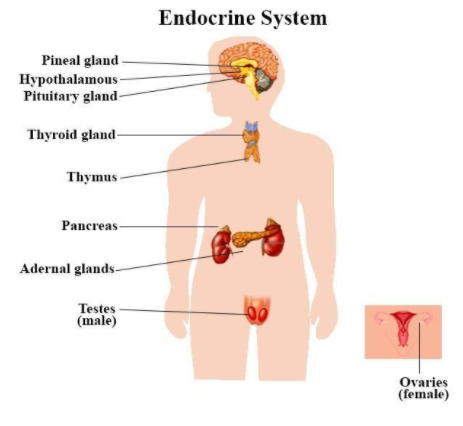
The ductless glands in the human body which secretes hormones are called as
(a)Exocrine glands
(b)Endocrine glands
(c)Epithelial glands
(d)Metabolic glands
Answer
593.4k+ views
Hint: These glands secrete their chemical substances into the bloodstream directly and acts as the body’s control system. They are also called the ‘Glands of internal secretions’.
Complete answer:
Endocrine glands are the ductless glands in the human body that secretes their hormones into the blood. The endocrine system consists of various endocrine glands that are responsible for the processes occurring in the body.
Additional Information:
-The glands are the hormone-producing structure that performs specific functions.
-The endocrine system includes the pituitary glands, pineal glands, pancreas, gonads, hypothalamus, thyroid glands, etc.
-The main gland is the pituitary gland which directly secretes the hormone into the blood.
-The pituitary gland is the most important gland of the body and is called the ‘master gland’.
-In humans, thy hypothalamus is the main control center for all the endocrine system.
-The largest gland of the body is the pancreas which helps in the transportation of the sugars inside the body.
-The pineal gland is known as the third eye because it is deeply situated at the back of the head and helps in the rhythmic cycles and hormone secretion.
-The pituitary glands along with the adrenal glands will constitute the neuroendocrine cells.
-The thyroid gland is an example of this type of gland that helps in growth and development.

So, the correct answer is, “Endocrine glands.”
Note: The word endocrine was derived from the New Latin which is taken from the Greek words endon, meaning "inside or within," aand crine from the word Krino, meaning "to separate or distinguish". Endocrinology is the study of the endocrine system and its disorders. The second type of gland is known as the exocrine gland which has ducts and does not secrete directly into the blood.
Complete answer:
Endocrine glands are the ductless glands in the human body that secretes their hormones into the blood. The endocrine system consists of various endocrine glands that are responsible for the processes occurring in the body.
Additional Information:
-The glands are the hormone-producing structure that performs specific functions.
-The endocrine system includes the pituitary glands, pineal glands, pancreas, gonads, hypothalamus, thyroid glands, etc.
-The main gland is the pituitary gland which directly secretes the hormone into the blood.
-The pituitary gland is the most important gland of the body and is called the ‘master gland’.
-In humans, thy hypothalamus is the main control center for all the endocrine system.
-The largest gland of the body is the pancreas which helps in the transportation of the sugars inside the body.
-The pineal gland is known as the third eye because it is deeply situated at the back of the head and helps in the rhythmic cycles and hormone secretion.
-The pituitary glands along with the adrenal glands will constitute the neuroendocrine cells.
-The thyroid gland is an example of this type of gland that helps in growth and development.

So, the correct answer is, “Endocrine glands.”
Note: The word endocrine was derived from the New Latin which is taken from the Greek words endon, meaning "inside or within," aand crine from the word Krino, meaning "to separate or distinguish". Endocrinology is the study of the endocrine system and its disorders. The second type of gland is known as the exocrine gland which has ducts and does not secrete directly into the blood.
Recently Updated Pages
Master Class 11 Computer Science: Engaging Questions & Answers for Success

Master Class 11 Business Studies: Engaging Questions & Answers for Success

Master Class 11 Economics: Engaging Questions & Answers for Success

Master Class 11 English: Engaging Questions & Answers for Success

Master Class 11 Maths: Engaging Questions & Answers for Success

Master Class 11 Biology: Engaging Questions & Answers for Success

Trending doubts
One Metric ton is equal to kg A 10000 B 1000 C 100 class 11 physics CBSE

There are 720 permutations of the digits 1 2 3 4 5 class 11 maths CBSE

Discuss the various forms of bacteria class 11 biology CBSE

Draw a diagram of a plant cell and label at least eight class 11 biology CBSE

State the laws of reflection of light

Explain zero factorial class 11 maths CBSE




